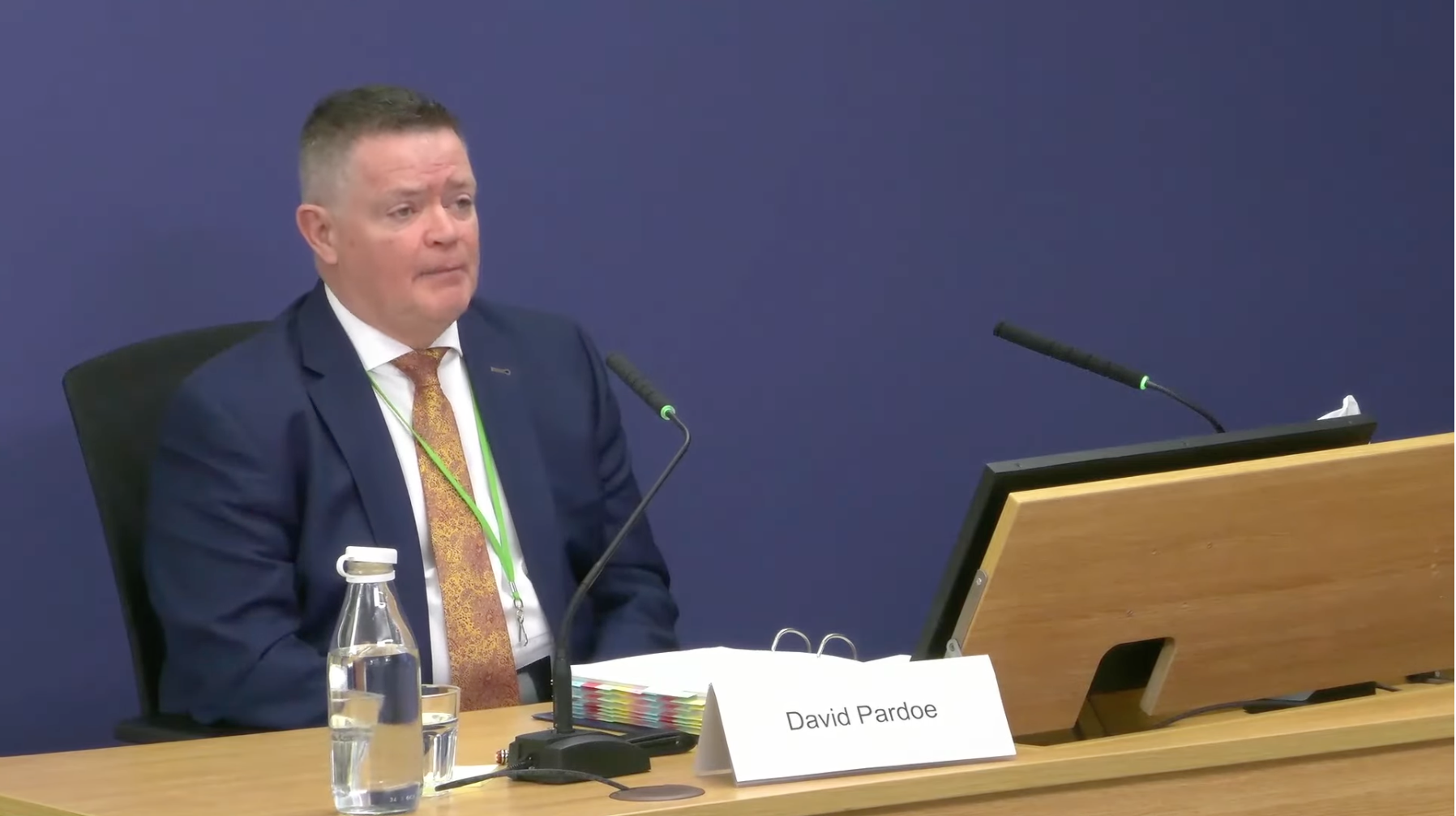
A throwaway line in a piece of oral evidence at the Horizon IT inquiry yesterday may have revealed more about the cover-up which some are now openly calling a criminal conspiracy to pervert the course of justice at the Post Office.
The evidence came from Dave Pardoe, a former Senior Security Manager, invested with the power to sign off on Subpostmaster prosecutions.
Pardoe’s evidence followed a familiar line – that Post Office investigators were told they shouldn’t consider Horizon as the source of a discrepancy at a branch. Then he said:
“There was a persistent sentiment that the system was fit for purpose. I was never in a meeting when it was discussed with me the concept of putting the brakes on prosecution activity. It’s clear that there was a fear that, to do that, would immediately cast doubt on prosecutions that had been completed, that had gone before.”
Pardoe is the first Inquiry witness I can recall to suggest there was a “clear” awareness within the Post Office that looking too closely at the Horizon IT system might uncover miscarriages of justice.
This goes to the heart of the Post Office scandal. In my view it should be both the main purpose of the Inquiry and the ongoing Metropolitan police investigation. It’s one thing to erroneously prosecute innocent people on the basis of false information. It’s another thing to keep on prosecuting more innocent people because the reputational cost of stopping has become too great.
Spelling it out
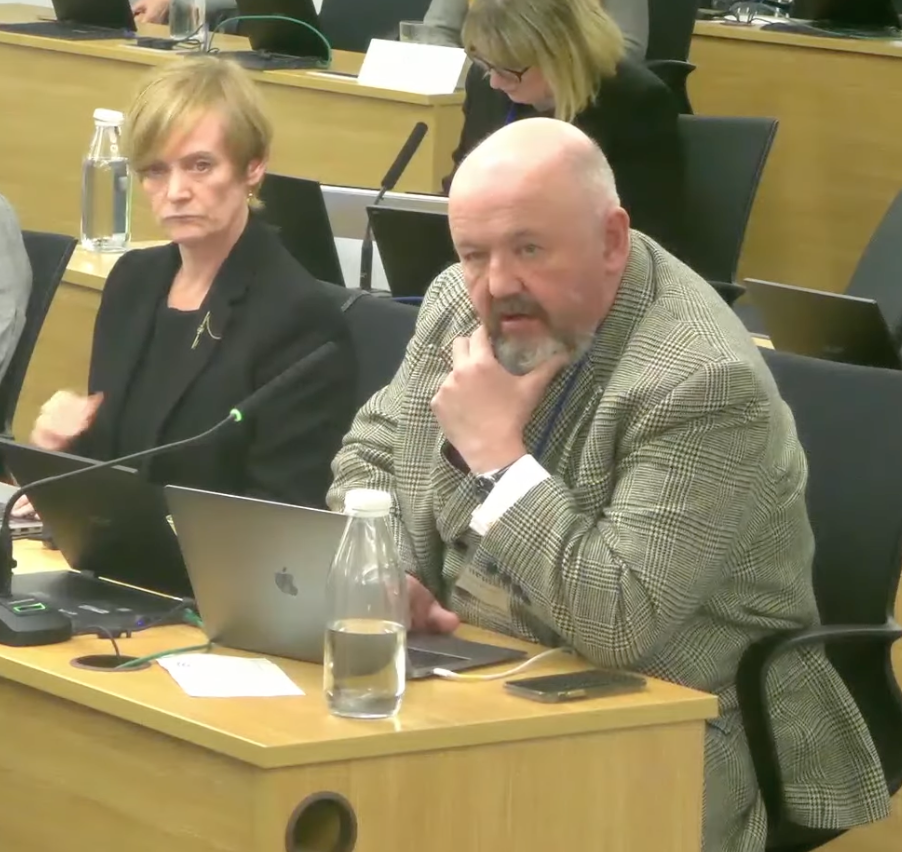
In their closing statement to phase three of the Inquiry, Ed Henry KC and Flora Page, instructed by Hodge, Jones and Allen, set out the threshold for a conspiracy to pervert the course of justice, which, they say, is committed “when two or more people agree to embark on a course of conduct which has a tendency to, and is intended to, pervert the course of public justice.“
Henry et al note that “a person may be attributed with knowledge if the evidence suggests that they “deliberately shut their eyes to the obvious, or refrained from inquiry because they suspected the truth but did not wish to have their suspicion confirmed“.”
It could be argued that Pardoe’s description of a corporate “fear” that “putting the brakes on prosecution activity” could “immediately cast doubt on prosecutions that had been completed”, falls squarely into the above definition.
The Ismay-Wilson axis
Pardoe’s recollection is backed up by internal Post Office documentation. On 3 March 2010, the Head of Criminal Law at the Post Office, Rob Wilson, issued an internal email complaining about not being invited onto a conference call about problems with Horizon. A memo of the meeting concluded a thorough investigation of the Horizon system should be commissioned. Wilson had a problem with this, though he starts well, stating:
“If it is thought that there is a difficulty with Horizon then clearly the action set out in your memo [an independent investigation of Horizon] is not only needed but is imperative.”
But then he goes on to write:
“Such an investigation will be disclosable as undermining evidence on the defence in the cases proceeding through the criminal courts. Inevitably the defence will argue that if we are carrying out an investigation we clearly do not have confidence in Horizon and therefore to continue to prosecute will be an abuse of the criminal process. Alternatively we could be asked to stay the proceedings pending the outcome of the investigation, if this were to be adopted the resultant adverse publicity could lead to massive difficulties for POL [Post Office Ltd] as it would be seen by the press and media to vindicate the current challenges. The potential impact however is much wider for POL in that every office in the country will be seen to be operating a compromised system with untold damage to the Business… To continue prosecuting alleged offenders knowing that there is an ongoing investigation to determine the veracity of Horizon could also be detrimental to the reputation of my team.”
Note Wilson’s concern – “adverse publicity” and “reputation”. Not justice. After Wilson’s intervention, no independent investigation was carried out for another two years. Wilson’s sentiments were echoed on 2 August 2010 by the Post Office’s Head of Product and Branch Accounting, Rod Ismay, who was tasked by the incoming managing director David Smith to write a report rebutting the challenges to Horizon. Ismay falsely starts his report by claiming it is “objective” report. He concludes:
“It is… important to be crystal clear about any [independent Horizon] review if one were commissioned – any investigation would need to be disclosed in court. Although we would be doing the review to comfort others, any perception that POL doubts its own systems would mean that all criminal prosecutions would have to be stayed. It would also beg a question for the Court of Appeal over past prosecutions and imprisonments.”
On giving evidence to the Inquiry, Rod Ismay tried to suggest that although his name was on the report, he was barely the author at all, more of a cipher for other peoples’ assertions. When asked where he got the above paragraph from, he replied:
“That narrative would have come from speaking to somebody in the Criminal Law team… I imagine it probably came from a conversation with Rob [Wilson].”
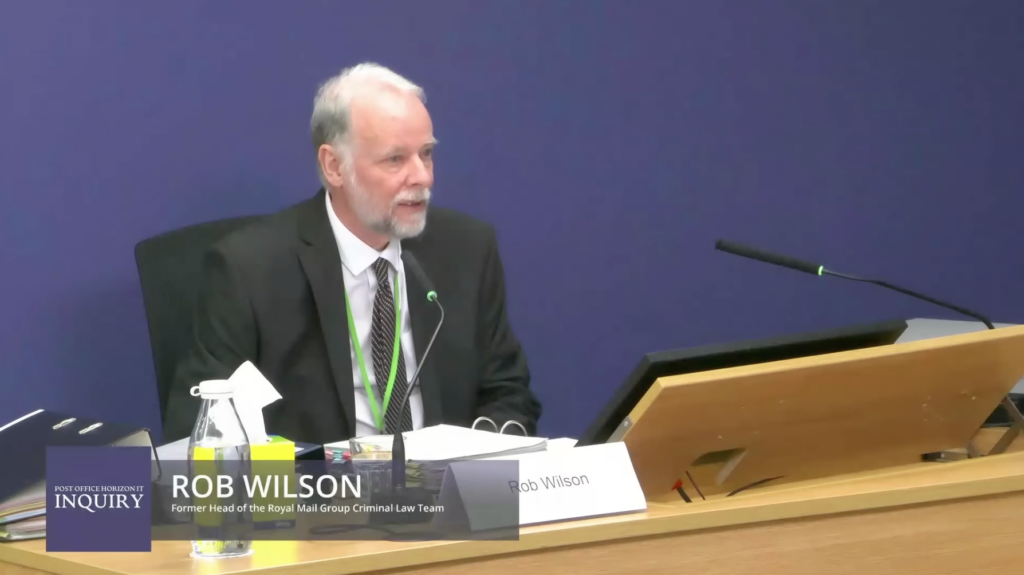
When Rob Wilson came to give evidence, he tried to suggest his 3 March 2010 email should essentially be disregarded as an “overstatement” of the situation, and that he had “overreacted to being excluded from what I saw as [a matter] being critical to me as the Head of the Criminal Law Team.”
Yet two years later, on 28 March 2012, Wilson’s colleague in Post Office’s legal services, Chris Darvill, wrote to the Post Office General Counsel Susan Crichton, reporting that Wilson was still holding out against an investigation of the Horizon system. Darvill told Crichton her Head of Criminal Law:
“has concerns regarding the PR implications over an audit being conducted… Rob also has concerns regarding the costs that would be incurred… Rob remains firmly of the view that an audit should not be carried out. In his words: “POL has to grit its teeth and get on with prosecuting and defending civil actions”.”
When this extraordinary take on the situation was raised at the Inquiry by Jason Beer KC, it led to the following exchange:
Jason Beer: Was it your view that POL should just grit its teeth and get on with prosecuting people?
Rob Wilson: I think so, yes.
Jason Beer: Just carry on regardless?
Rob Wilson: Well…
Jason Beer: More important than whether or not there was a problem with the system was public relations and cost?
Rob Wilson: Well, I didn’t believe that we had a problem with the system because of the Rod Ismay report.
In 2012, Wilson’s essentially mad position was overruled by Crichton, who brought in the independent investigators Second Sight who, under great pressure, eventually blew the whole scandal open.
Yesterday, when Pardoe was asked whether the “persistent sentiment” he described came from his boss John Scott, (the former Post Office Head of Security), Wilson agreed it did, but then said:
“The one I remember probably with greater clarity is the Paula Vennells communication… I’m sure that that preceded known media interest that was imminently about to go public, and I’m sure that there was some form of written communication to say, you know, “Look, folks, this is likely to be out within the public domain and the approach we’re taking is this, this, this and this”, to paraphrase.”
Counsel to the Inquiry picked this up. “So the whole organisation was told “There’s going to be something in the media about Horizon and it is to be disregarded because everything is robust” and…”
Pardoe replied: “I certainly recall a… reading a written rebuttal and position that the business were adopting, yes.“
Pardoe was asked if this communication from Vennells had come before Rebecca Thomson’s seminal Computer Weekly article in 2009, which put the Horizon scandal into the public domain. Pardoe agreed it might, but in 2009 Vennells was the Post Office’s Network Director. She didn’t become Managing Director until very late in 2010, so Pardoe’s memory might be faulty, or Vennells might have been the author of the communication, but I think his recollection of the fact of the company-wide communication from on high is significant, because it makes a connection between:
a) the “clear… fear” within the Post Office that looking too closely at Horizon might reveal miscarriages of justice,
b) the determination to defend Horizon at all costs,
c) the fact it was coming from the very top.
Paula Vennells has yet to give evidence to the Inquiry. Her last substantial public utterings on the matter can be read in her dismal submission to the Business Select Committee in 2020.
Despair and deceit
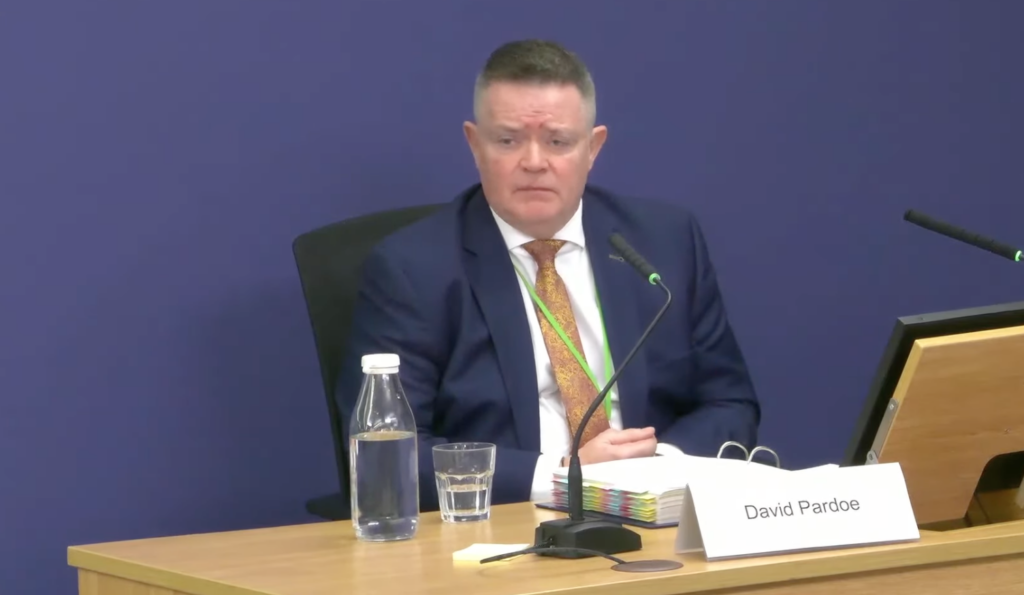
In his witness statement to the Inquiry, David Pardoe states:
“The more I see and hear from the Inquiry, then the further I despair. It strikes me that no one, at a suitable level of seniority, had the conviction and gumption to say enough is enough and to drive a timely, truly independent review whilst ceasing all prosecution activity and having the courage to be prepared to support the application and lessons of a truly independent Horizon review to both historic prosecutions and non-prosecuted repayment of accounting shortfalls. As someone that held several investigatory roles in the Post Office, I feel utterly deceived.”
Pardoe was less keen to admit to much in the way of self-deception. During his evidence he was taken to several documents dated between 2010 and 2014 which made explicit some serious technical problems with Horizon. Pardoe accepted he would have seen these document and was undoubtedly senior enough to do something about them. Sadly he didn’t.
Pardoe was also shown a 2013 report which, again, he would have seen at the time. It stated that a Procurator Fiscal in Scotland had declined to let the Post Office proceed with a prosecution of a Subpostmaster on the basis of “issues with Horizon”.
Pardoe slipped into “don’t recall” mode.
Janet Skinner
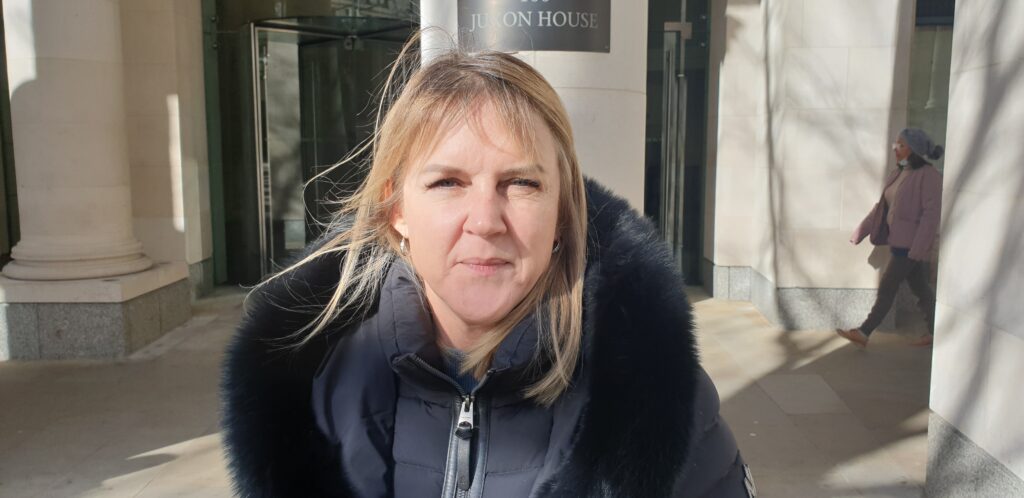
Finally, Ed Henry KC brought up Janet Skinner’s case. Janet had huge problems with the Horizon system at her North Bransholme branch in Hull. She had been reporting them to the Horizon helpline, making 116 calls in total, but was nevertheless suspended over an alleged £60,000 discrepancy and was prosecuted for theft.
Mr Henry pointed out that Janet’s successor at the same branch, Wendy Lyell, survived a few weeks before she too was arrested on suspicion of theft when the same Horizon system generated more discrepancies.
It transpires that one of Pardoe’s subordinates, Mick Matthews, was investigating Janet Skinner for the purposes of issuing a Proceeds of Crime Act Order against her when he clocked that Wendy Lyell had suffered discrepancies immediately after taking over from Janet. Matthews wrote in a financial investigation policy log that he sought to find out what had happened with regard to investigating Wendy Lyell’s case. He reported that on doing so he:
“received an email from Dave Pardoe, my new line manager, to the effect that no further resources were to be expended on the case in respect of Wendy Lyell.”
Matthews was concerned. “It occurred to me that in the interests of justice we could be rightly criticised for not carrying out a comprehensive investigation into Wendy Lyell. I spoke with and asked [Pardoe] to reconsider allocating resources in order for the matter to be further investigated.“
Pardoe reportedly replied that he would not reconsider, allegedly adding: “… if we are criticised, so be it.”
No further investigation resource was allocated.
Yesterday, Pardoe told Henry that he didn’t recall this episode, nor was it consistent “within my leadership style.”
Janet Skinner was persuaded to plead guilty to theft to avoid a custodial sentence, but the judge sent her to prison for nine months anyway. Janet lost her house and moved into rented accommodation with her young children. The Post Office pursued her for the money she had allegedly stolen, and issued a warrant for her arrest when the Proceeds of Crime Act Order demands (presumably put together by Mick Matthews) went unanswered, having been sent to her repossessed home.
Eighteen months after being sent to prison, and suffering the stress of nearly going back, Janet suffered a complete neurological collapse by transverse myelitis. She was temporarily paralysed and told she might never walk again. Thankfully Janet has partially overcome her illness and has lived to see her conviction quashed.
During his evidence to the Inquiry, David Pardoe admitted he was part of a “groupthink“. He was asked: “Looking back, do you think you bore any responsibility for what happened to the individuals who were affected?”
Pardoe replied “I think, in the absence of a more complete ability to conduct investigations into those conditions, then yes.“
The journalism on this blog is crowdfunded. If you would like to join the “secret email” newsletter, please consider making a one-off donation. The money is used to keep the contents of this website free. You will receive irregular, but informative email updates about the Post Office Horizon IT scandal.

Leave a Reply